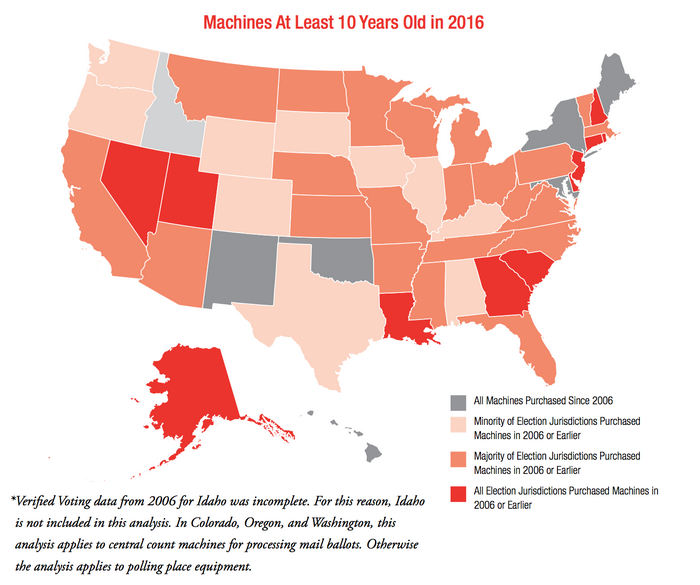|
The
nation's voting machines are aging out, and experts are raising
concerns about what that could mean for next year's elections.
A new report by the Brennan Center for Justice titled "America's Voting Machines at Risk" details
the voting technology crisis across the U.S. The problem is especially
pressing in the South, where states are heavily reliant on machines
purchased in 2006 or earlier — and where many local officials say they
lack sufficient funds to buy new ones.
"No
one expects a laptop to last for 10 years," said Lawrence Norden,
deputy director of the Brennan Center's Democracy Program and the
study's co-author. "How can we expect these machines, many of which
were designed and engineered in the 1990s, to keep running without
increased failures?"
After the Florida presidential election debacle in 2000,
Congress appropriated $2 billion to transition to electronic voting
systems. But the technology is aging and needs to be replaced.
The
study says the biggest risks from aging machines are increased failures
and crashes, which can lead to long lines and lost votes. Elections
officials also expressed concerns over "flipped votes" on touch screen
machines, where a voter tries to select the name of one candidate but
the machine registers it as a selection for someone else. Last year in
Virginia Beach and Newport News, Virginia, for example, both
Republicans and Democrats reported that touch screen machines were registering votes incorrectly, with one voter being told his finger was "too fat."
Across
the South, all election jurisdictions in three states — Georgia,
Louisiana and South Carolina — purchased their voting machines in 2006
or earlier. In seven Southern states — Arkansas, Florida,
Mississippi, North Carolina, Tennessee, Virginia, West Virginia — the
majority of election jurisdictions purchased machines in 2006 or
earlier. No Southern states are among the handful where all the voting
machines have been purchased since 2006.

In
14 states across the country, voters will be using machines that are 15
or more years old. Four of those states are in the South: Florida,
Louisiana, Texas and Virginia.
"I just will tell you that it's getting a little scary out there," Louisiana Secretary of State Tom Schedler told a
legislative committee earlier this year. "Voting machine equipment is
all 15-20 years, plus." Others testified about local elections
officials having to scavenge parts from old machines to keep current
machines operating.

The
Brennan Center report found that jurisdictions in 31 states want to
purchase new voting equipment in the next five years, but officials in
22 of those states said they didn't know where they would get the
money. Almost half of those states are in the South: Alabama, Arkansas,
Florida, Louisiana, Mississippi, North Carolina, Tennessee, Texas,
Virginia and West Virginia.
The
cost to taxpayers of replacing the outdated equipment nationwide could
exceed $1 billion, according to the study. But the cost to democracy of
not replacing it could be incalculable.
"Old
equipment can have serious security flaws, and the longer we delay
purchasing new machines, the higher the risk," said the Brennan
Center's Norden. "To avoid a new technology crisis every decade, we
must plan for and invest in voting technology for the 21st century."
|

